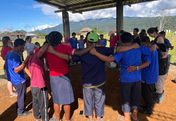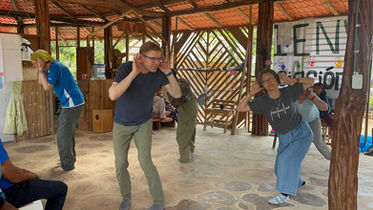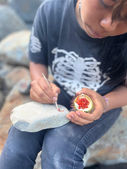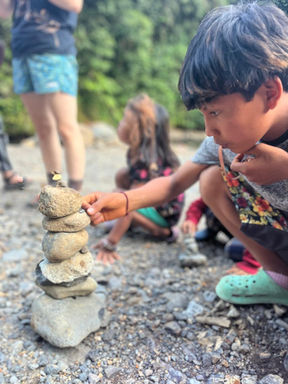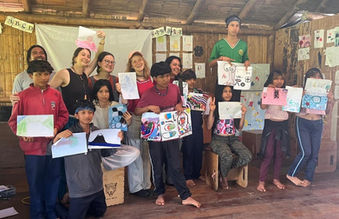Beyond the Gift:
A Workshop on Institutional Giving in a Changing World
2025 - 2026
Offered Online and In-Person by reservation.
Cost: sliding scale based on size and scope of your organization
Or sign-up for one of our public offerings (virtual)
Workshop 1: September 17, 2025 at 12PM (Eastern Time)
Workshop 2: November 13, 2025 at 12PM (Eastern Time)
Cost: $80
DESCRIPTION
A Pachaysana Unlearning Workshop
As government funding shrinks and philanthropic landscapes shift, many institutions, especially colleges and universities, are facing hard questions:
How do we sustain community engagement? How do we uphold our values of equity, justice, and sustainability in a time of increasing uncertainty?
We believe these challenges are not just obstacles—they are invitations.
Invitations to unlearn deeply rooted ideas about charity, impact, and institutional value.
For too long, institutional giving has followed a familiar pattern: receive funds from governments or foundations, distribute them to projects, programs, or beneficiaries, and report outcomes to justify the cycle. But this model keeps us locked in transactional thinking, where giving is measured, managed, and often disconnected from lived relationships.
It's time to move beyond that.
It’s time to explore the roots of what it means to give—beyond compliance, beyond optics, beyond the binary of giver and receiver.
To reimagine giving not as a mechanism for support, but as a practice of mutual restoration. A way of relating to one another that transforms all involved.
Led by our Executive Director, Chochi Iturralde—recognized in TIME Magazine’s 100 Most Influential in Philanthropy—this workshop invites your institution, organization or campus to re-story giving as relational responsibility—a way of being and building together.
WHO IS THIS WORKSHOP FOR?
This workshop is designed for individuals and institutions who are ready to challenge conventional models of giving and step into more relational, reciprocal forms of engagement:
Colleges and universities
Educators
Professors, lecturers, and graduate teaching assistants seeking to expand their curriculum with more inclusive, intercultural, and justice-centered frameworks. This workshop supports those who want to integrate values of reciprocity and community into their teaching.
Administrators
Staff in areas such as international programs, student affairs, civic engagement, institutional advancement, and diversity & inclusion. Particularly valuable for those seeking to align institutional practices with values of equity and co-creation, while building ethical partnerships.
Students
Undergraduate and graduate students passionate about social change, environmental justice, and Indigenous-led movements. The workshop provides tools to unlearn extractive activism and engage with communities through mutual respect and care.
Non-Profits and activists
Community organizers
Individuals who work at the intersection of social justice, environmental action, and cultural renewal. This includes both on-campus and off-campus organizers who want to rethink charity and aid models through a lens of mutual restoration.
Non-Profit Leaders
People working in NGOs or community-based organizations who are eager to deepen the ethical foundations of their work and explore alternatives to donor-driven program design.
Grassroots Activists
Organizers embedded in their local communities who want to build new narratives of justice and sustainability from the ground up, often through collaboration with educational institutions.
philanthropists and business leaders
Philanthropists
Individuals and families who give financial resources and want to better align their giving with values of justice, humility, and long-term relational accountability. This includes both seasoned funders and emerging givers.
Corporate Social Responsibility (CSR) Professionals
Business and foundation professionals managing CSR programs who are interested in making their impact more sustainable, ethical, and community-driven. This workshop offers insights into shifting from optics to authenticity.
Changemakers
Anyone—regardless of role or background—committed to building a more equitable and regenerative future. Ideal for those who recognize that unlearning is a key part of transformation, and who are ready to rethink how we relate, give, and restore.
In this workshop, we explore:
-
Why dominant models of giving—based on pride, performance, or power—no longer serve our shared future
-
What it means to root giving in presence, reciprocity, and relational accountability
-
How colleges and universities can shift from extractive partnerships to co-creative ones
-
How we might unlearn the habits of institutional charity and embody new practices of connection and commitment
-
What it looks like to be part of a growing movement of relational giving that regenerates ecosystems, communities, and culture
For college and University partners:
Applying This to Your Campus
What changes when we unlearn traditional philanthropy and embrace relational giving?
Here are practical ways institutions can bring this shift into daily campus life:
-
Reframe Institutional Partnerships
Shift community engagement offices from “outreach” to reciprocal exchange, where local communities are co-educators and co-designers of programs. -
Transform Donor Engagement
Move from tiered metrics and naming rights to story-driven relationships that highlight co-creation and shared impact. -
Integrate into Curriculum
Embed unlearning practices into academic programs through frameworks like Carbon Onsetting. -
Cultivate a Campus Culture of Reciprocity
Encourage students, faculty, and staff to view giving not as charity, but as a daily practice of mutual care—in environmental stewardship, community collaboration, and interpersonal relationships. -
Reimagine Volunteerism and Internships
Ensure student experiences are not extractive. Design placements with communities as partners, not beneficiaries. -
Train Campus Leaders in Relational Giving
Offer professional development for administrative staff and advancement officers on unlearning performative philanthropy and practicing presence-based engagement. -
Create Campus Rituals of Gratitude and Accountability
Introduce meaningful changes—like honoring community partners at events, pairing land acknowledgments with action, and inviting students into reflective practices around giving.
This is more than a workshop
It’s a portal into a different kind of future.
One where we measure success not by what we give away—but by what we are willing to share, restore, and rebuild—together.
WHAT DO PREVIOUS PARTICIPANTS THINK OF THE
UnlearninG workshops?
Makayla Ndamele, Affinity and Alum Program Coordinator, Young Women Empowered
“The breadth and emotional vulnerability expressed in the storytelling and experiential learning resonated deeply with me. It reflected the kind of lessons I hope to continue learning from and sharing with the youth I work with, as well as my family and the broader community around me. I witnessed the power of honesty and connection in a way that felt both grounding and transformative.”
Hui Wilcox,
Dean, Kofi Annan Institute for Global Citizenship,
Professor of sociology, Macalester COllege
"A much-needed decolonial perspective on community building and cultural change. I'm thinking deeply about ways in which we can actually slow down, be more community-centered and cultivate joy and celebration while doing serious work on critical global engagement.”
Derek Johnson, Assistant Director, Community engagement, Kofi Annan Institute for Global Citizenship, Macalester college
“The experience energizes me as I engage in community-based work locally where I live. And, it gives me new perspectives and practices that I will bring with me as I engage in community work. It also will impact how my family relates to the environment around us and places that we are able to visit.”
Ash Trebisacci, Assistant Director of Study Abroad, Brandeis University
“In a role that is so focused on the intellectual and so often disconnected from the body, it was hugely impactful for me to become more grounded in my body throughout the workshop, and to truly understand the impact that movement and physicality can have in change efforts. The workshops inspired me to help my students find spaces where they, too, can reconnect with themselves and unlearn in order to build their capacity for activism”
Michelle Wibbelsman, Associate Professor, Department of Spanish and Portuguese, The Ohio State University
"Unlearning workshops invigorated our classroom methodologies in immediate and powerful ways, exposed faculty and students to alternative pedagogies, and provoked meaningful reflections and dialogue that engage with broader issues of racial injustice, diversity and inclusion.”
Jolynn Pasqualucci, Graduate Student, Global Education & TESOL, Providence College
“People came together to share their personal truths, their stories, and their testimonies in a safe space, and from that grow in spirit and as people. We were encouraged to embrace our culture, no matter where we are from and our history. The work creates a common ground to be your authentic self. It felt like my soul was set free and many of us left the experience in tears, but happy tears.”
Josep Alba-Salas, Chair, Spanish Department, College of the Holy Cross
"My colleagues and I found the Unlearning workshops to be extremely relevant not only to our department’s continued efforts to decolonize the curriculum and explore non-canonical epistemologies, but also to our institution’s commitment to anti-racism and social justice”
Dr. Emily Gorlewski, Director, Study Abroad, Fries Center for Global Studies, Wesleyan University
"Unlearning workshops use the principles of embodiment and storytelling to create powerful experiences of affective learning”
Shoshanna Sumka, Executive Director, ISEEN, Independent Schools Experiential Education Network
"Unlearning workshops incorporate movement, poetry, and indigenous cosmology that challenge and revolutionize assumptions about the very nature of education. Their methodology follows the experiential learning cycle of direct experience, reflection, analysis and experimentation and embraces the notion of storytelling as an essential part of human history”

